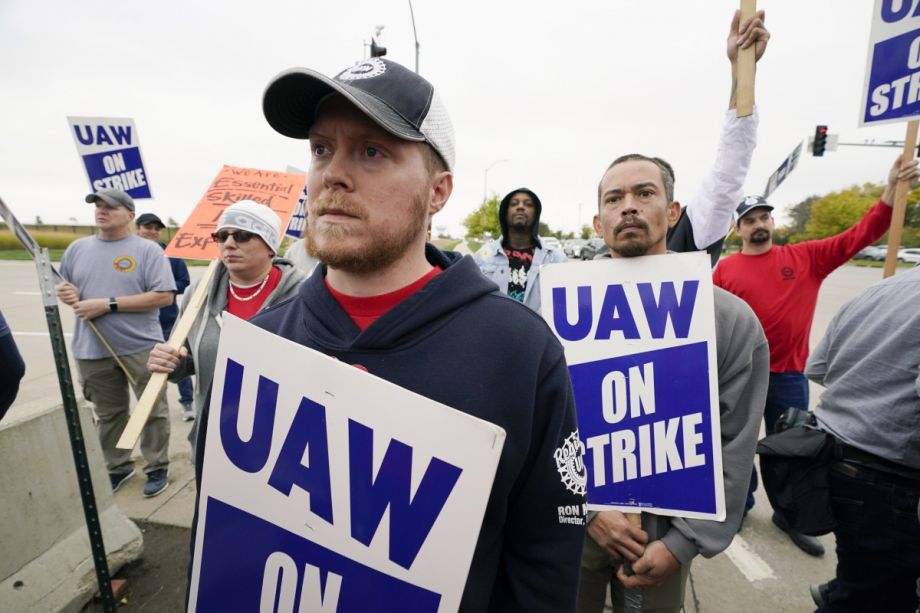John Deere Workers Reject Deal, Remain on Strike
More than 10,000 auto workers will remain on strike against John Deere after 55% of union members voted against the company’s second proposal, CNN reports. The company says that was its final offer, the NYT says.
John Deere workers were striking at 14 locations, though now union members at Atlanta and Denver facilities have accepted the proposed deal, meaning only 12 locations remain on strike.
John Deere initially committed to investing $3.5 billion into their workers and communities. Employees would see an immediate 10% increase in wages, with a 30% wage increase over the term of contract. They would also receive an $8,500 bonus, stronger health care, better retirement benefits, and paid parental leave. However, union members rejected this deal because they felt the company could negotiate even greater benefits and pay increases. (John Deere is on track to generate “record” profits this year, Bloomberg reported.)
Mitchell Smith, regional director of the United Auto Workers (UAW) said, “strikes are never easy on workers or their families but John Deere workers believe they deserve a better share of the pie, a safer workplace and adequate benefits.”
Democrats Propose a National Green Bank to Help Fund Green Infrastructure
Democrats are considering a green domestic development bank in order to build and fund green projects to make them cheaper than those using fossil fuels, The Hill reports.
Representatives from Maryland, Massachusetts and Michigan added the Clean Energy and Sustainability Accelerator proposal to the Build Back Better plan last week, with a plan to create a $29 billion development fund that could mobilize another $232 billion in community investment over the next decade.
The proposal isn’t new. Since 2009, green bank bills have been passed three times in the House, though none have passed the Senate.
Critics fear that green banks will be reminiscent of the 2009 Obama spending bill that allocated more than $80 billion towards green energy projects, where much of the money was wasted. Advocates, on the other hand, say that green banks have proved their worth. More than 22 state-level green banks are currently helping ease the transition to green energy across the United States.
Transitioning to a low-carbon economy would require funding projects that can range from $100,000 to $10 million. This quantity is too big for small banks, and too small for commercial banks to offer loans for.
Download Next City’s ebook on green banks — Financing our Green Future — at a pay-what-you-wish cost here.
New York Tightens Fair Lending Rules
New York has expanded the state’s Community Reinvestment Act to nonbank mortgage lenders, according to a New York Department of Financial Services’ press release.
The decision means that these lenders — mortgage bankers such as Rocket Mortgage — must now adhere to anti-redlining obligations. These lenders process a large portion of home loans, and are the main entity responsible for mortgage originations both across the state and nationally. An investigation into redlining in Buffalo saw that nonbank mortgage lenders were also “failing to serve their whole communities,” especially minority borrowers.
Adrienne Harris, the state Department of Financial Services’ acting superintendent called this a win, saying “this law ensures borrowers have equal access to mortgage financing and provides a thoughtful framework for them to be part of the solution to achieve the American dream of homeownership.”
Boston Votes Yes on Budget Reform
More than two out of three Boston voters have approved a new measure that allocates stronger power to the city council in the city’s budget process, according to the Boston Globe.
Next City previously reported on this reform, which allows the council to propose and vote on budget spending so long as it does not exceed the mayor’s original budget spending proposal. The mayor can then reject, amend or accept the council’s budget, with the Boston City Council potentially overriding an amendment with a two-thirds vote.
Advocates for the initiative believe this reform will allow the council to fund projects and initiatives the city should be invested in, such as those that will help reduce racial inequality.
“The budget of the city is its moral compass,” Boston City Councilmember Lydia Edwards said.
“What it prioritizes, it funds. As a city, we declared racism is a public health crisis, but if we’re not putting the money and our moral compass toward closing that gap, that is directly connected to our lack of power.”
This article is part of The Bottom Line, a series exploring scalable solutions for problems related to affordability, inclusive economic growth and access to capital. Click here to subscribe to our Bottom Line newsletter.

Solcyre (Sol) Burga was an Emma Bowen Foundation Fellow with Next City for summer 2021. Burga graduated from Rutgers University with a degree in political science and journalism in May of 2022. As a Newark native and immigrant, she hopes to elevate the voices of underrepresented communities in her work.
.(JavaScript must be enabled to view this email address)


















